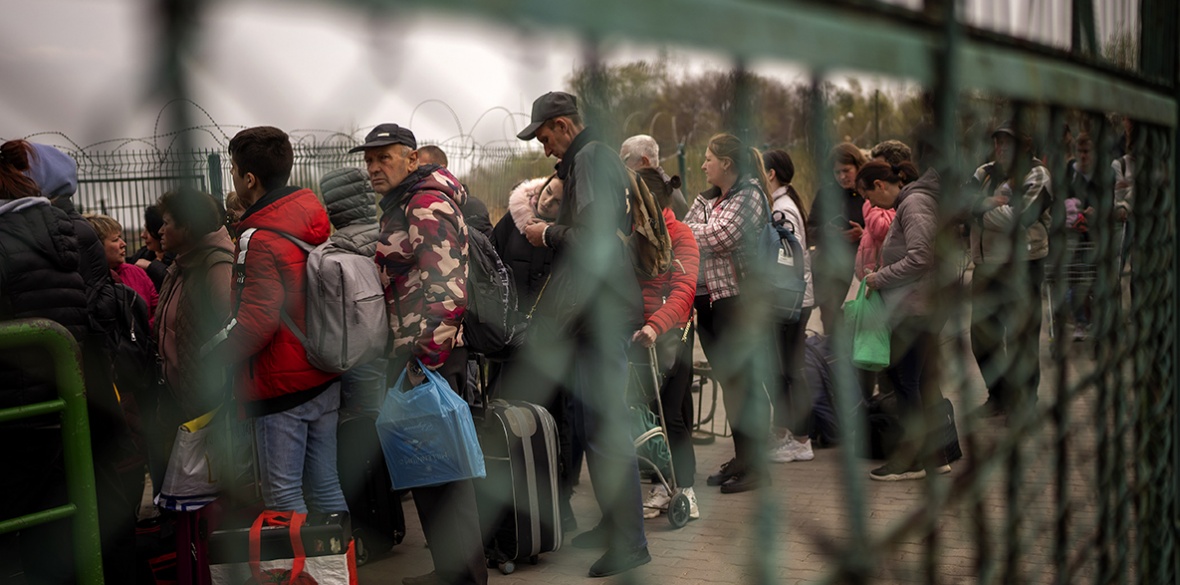This is the last article you can read this month
You can read more article this month
You can read more articles this month
Sorry your limit is up for this month
Reset on:
Please help support the Morning Star by subscribing here
A STUDENT helping to evacuate disabled Ukrainians has warned that many remain trapped in the country without proper care or the basic supplies needed for survival.
Anna Landre, a US disability rights activist based in London, said this is especially the case for disabled Ukrainians stuck in institutions like care homes and orphanages, who are “overwhelmingly being left behind in the humanitarian response.”
“We've heard from institutions where disabled residents are living in half-bombed buildings, lacking the proper care staff, running out of food and medications, and living without heat and water,” Ms Landre told the Morning Star. “The situation is dire.”
Since the Russian invasion, campaigners have warned that disabled Ukrainians are at risk of being “abandoned” due to a lack of accessible evacuation routes out of the country and a lack of support from humanitarian groups and the authorities.
An informal network of disability rights campaigners has since emerged to fill in this gap in support.
Ms Landre, a 23-year-old wheelchair user, decided to put her studies at the London School of Economics temporarily on hold in February in order to help coordinate the evacuations of disabled Ukrainians from afar.
“Due to a lack of accessible evacuation opportunities, many people with disabilities are still trapped in Ukraine,” she said.
“We are urgently trying to reach these individuals, many of whom lack the proper care and basic supplies they need to survive.”
She is one of four volunteers in Britain working with the Fight for Right group, a Ukrainian disability rights group helping disabled Ukrainians out of the conflict zone, along with volunteers in the US, Serbia, Poland, Ukraine and Denmark.
So far the network has helped over 600 disabled Ukrainians to flee the country, or find accessible housing, medication and financial assistance, she said.
Among those is Ukrainian disability rights activist Tanya Herasymova, who fled Ukraine with her mother on February 25, the second day of the Russian invasion.
Ms Herasymova, who uses a wheelchair and is the project manager for Right for Fight, said she had to be carried onto a train bound for Lviv as the trains are not accessible to people with mobility disabilities.
She was helped out of the country by a Fight for Right colleague and describes her escape as a “miracle.”
Ms Herasymova now facilitates the evacuation of other disabled Ukrainians from Denmark, where she is currently staying, but says the situation is getting worse.
“It is becoming more difficult to evacuate,” she told the Star. “There is a lack of transport in cities, with no possibilities to evacuate people from occupied cities, and lack of medical transportation.”
In some cases they have been unable to help. Ms Herasymova says her close friend who has severe disabilities was forced to go to Russia-controlled Crimea because it was too dangerous to stay in her home in the neighbouring Kherson region.
“There were no ways to flee on the Ukrainian side,” she said. “Many people stay there without any choice. People are dying because of a lack of medicines, water, or food.”
Fight for Right has called on the international community, Ukraine authorities and aid groups to prioritise the evacuation of people with disabilities and do more to provide accessible evacuation routes out of the country.
However Ms Landre said that despite these calls, humanitarian groups have failed to “make strides to adjust their behaviour to include people with disabilities.”
“Humanitarian organisations need to be held accountable for failing to commit to basic promises of inclusion, which often entail things as simple as purchasing accessible vehicles and hiring staff who are culturally competent on disability issues.”
Ms Landre said that Fight for Right’s efforts show that it is possible to carry out disability-inclusive evacuations and aid even with few resources.
Asked about the emotional toll of the work on volunteers helping with the evacuations, Ms Landre said: “Fight for Right's staff and volunteers are overwhelmingly people with disabilities ourselves, and mostly women with disabilities.
“This makes the work personal. We know that in a crisis, we would be the ones left behind by the same structures that are abandoning disabled Ukrainians. I think that drives our work. In the disability community, we care for one another.”
 Bethany Rielly
Bethany Rielly










